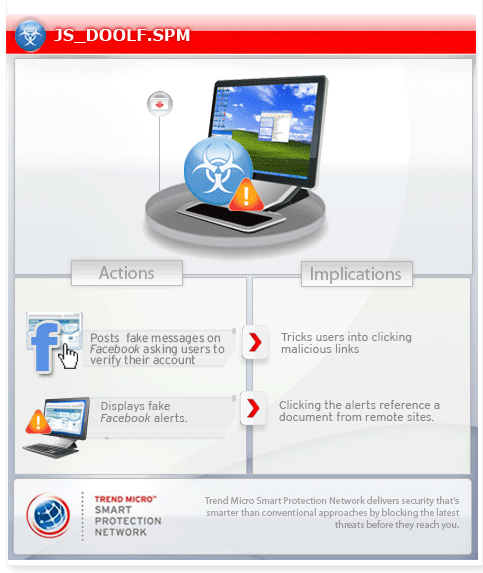JS_DOOLF.SPM
Windows 2000, Windows XP, Windows Server 2003


Threat Type: Trojan
Destructiveness: No
Encrypted: No
In the wild: Yes
OVERVIEW
This malware uses social engineering methods to lure users into performing certain actions that may, directly or indirectly, cause malicious routines to be performed. Specifically, it is a script used in a Facebook spam campaign.
To get a one-glance comprehensive view of the behavior of this Trojan, refer to the Threat Diagram shown below.

This is a script involved in a Facebook "verify my account" spam campaign. It posts messages on the walls of affected users' contacts.
The said routine is exhibited when a user clicks ==VERIFY MY ACCOUNT== from an infected user's post. It also displays certain alerts. The said alert will then reference a document from a remote site, which is inaccessible as of this writing.
This Trojan executes when a user accesses certain websites where it is hosted.
TECHNICAL DETAILS
Arrival Details
This Trojan executes when a user accesses certain websites where it is hosted.
It may be downloaded from the following remote sites:
- http://{BLOCKED}tenhe.info/verify.js
NOTES:
Other Details
This is a script involved in a Facebook "verify my account" spam campaign. It posts the following message on the walls of affected users' contacts:
“Inorder to PREVENT SPAM, I ask that you VERIFY YOUR ACCOUNT . Click VERIFY MY ACCOUNT right next to comment below to start the process.”
The said routine is exhibited when a user clicks ==VERIFY MY ACCOUNT== from an infected user's post.
It also displays the following alert:
Verification Failed. Click 'OK' and follow the steps to prevent your account from being deleted.
The said alert will then reference a document from the following site, which is inaccessible as of this writing:
- http://{BLOCKED}tenhe.info/verify.php?js
SOLUTION
Step 1
For Windows XP and Windows Server 2003 users, before doing any scans, please make sure you disable System Restore to allow full scanning of your computer.
Step 2
Close all opened browser windows
Step 3
Scan your computer with your Trend Micro product to delete files detected as JS_DOOLF.SPM. If the detected files have already been cleaned, deleted, or quarantined by your Trend Micro product, no further step is required. You may opt to simply delete the quarantined files. Please check this Knowledge Base page for more information.
Did this description help? Tell us how we did.


